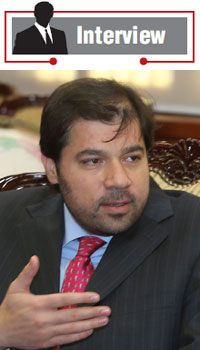Afghanistan calls for deeper ties with Korea
A senior Afghanistan official urged Seoul to facilitate engagement from Korea this week, saying economic projects will be vital for stability in 2014 when NATO scales down its forces in the war-torn nation.
During a visit to Seoul Monday, Afghani Deputy Foreign Minister Jawed Ludin underscored the country’s vast natural resources as an opportunity for companies here to gain a foothold in a country seeking to become a strategic transit hub, despite persisting jitters over instability.
The economic cooperation, Ludin said, would be a continuation of cooperation between the sides following Seoul’s reconstruction efforts in Afghanistan in recent years.
“What we would like to do is, in 2014, maintain a bilateral relationship with Korea on a solid, state-to-state basis,” he said during an interview in Seoul. “I was pleased to see there was a commitment on the side of the Korean government to continue and strengthen the bilateral relations.
“Afghanistan offers significant opportunities for business and investment. It is not only going to be a place for soldiers to play a role but where businesspeople need to come, investors and entrepreneurs, to take and use the opportunities that exist.”
The diplomat highlighted the country’s mining and agriculture sectors as potential destinations for private firms. Afghanistan is estimated to have trillions in untapped mineral deposits of iron, copper, cobalt, gold and rare earth metals such as lithium.
He said the country’s location at the crux of Central and South Asia and the Middle East positions it to become a hub facilitating the transit of goods and resources.
“Anything you do in Afghanistan, any investment, any foothold in the market is not just for the 30 million people of Afghanistan but potentially for the whole region,” he said.
In talks with officials including Foreign Minister Kim Sung-hwan, Ludin requested that Seoul lift a travel ban that has been in place since a 2007 hostage crisis, in which 23 Korean missionaries were captured and held hostage by the Taliban. Two were executed.
The incident is remembered “with a sense of horror,” Ludin said.
“We will do whatever we can to ensure stability, to make sure (potential investors) feel protected and safe. But we would really be grateful if the Korean government relaxes its restrictions on travel.”
Some 150 Korean aid workers and police officers known as the Provincial Reconstruction Team have been involved in a rebuilding mission in the northern city of Charikar since mid-2010, protected by some 350 troops.
Seoul has pledged $500 million in assistance over the next five years, which Ludin said would primarily go toward bolstering the police force and the army.
He said that while poverty and terrorism could not be directly linked, he believes greater engagement with the international community will help the situation. “A society is better off when it is more educated, has better opportunities for youth, when there is employment and a better quality of life. Then it is more difficult for terrorists to penetrate and find refuge,” he said.
Ludin said Seoul’s reconstruction efforts were paying off.
“I wish to highlight how much we appreciate the Korean people. We have many countries that came to help us over the last 20 years. But it was help from countries like Korea that really, truly made it international,” he said. <The Korea Times/Kim Young-jin>




















































